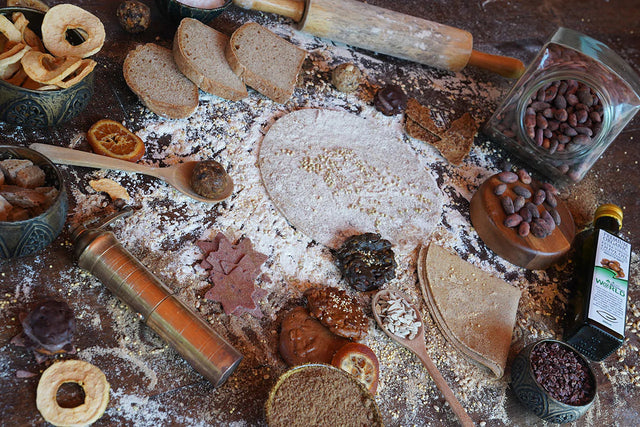Organic/Bio | Yogi Tea Echinacea
Product Description: Yogi Tea Echinacea is an intense, spicy-sweet herbal tea blend crafted to support physical balance and well-being. This Ayurvedic mix features prized echinacea, combined with rooibos, cardamom, and other organic ingredients. Naturally caffeine-free, this tea offers a harmonious blend of tangy, sweet, and strong flavors, making it perfect for any time of day.
Weight:
- 30.6g (17 Tea Bags | 1.8g each)
Origin:
- Imported from Germany
Flavor Profile:
- Tangy, Sweet, Strong
- Bitterness from Echinacea
- Sweetness from Fennel and Cardamom
- Spiciness from Ginger
Detail Ingredients:
- Cinnamon*
- Echinacea* (14%)
- Ginger*
- Fennel*
- Rooibos* (10%)
- Roasted Chicory*
- Carob*
- Cardamom* (4%)
- Basil*
- Burdock*
- Turmeric*
- Black Pepper*
- Tragacanth*
- Vanilla Beans*
- (*Certified Organic)
Usage Directions:
- Boil 250ml of water.
- Pour the hot water over one tea bag.
- Let it steep for 7-10 minutes, or longer for a stronger flavor.
- Remove the tea bag and enjoy your tea, hot or cold.
Storage Directions:
- Store in a cool, dry place away from direct sunlight and moisture to maintain the freshness and quality of the tea.
Caution:
- Check for any personal allergies to the listed ingredients.
- Consult a healthcare professional before using if you are pregnant, nursing, or on medication.
Conclusion: Organic/Bio Yogi Tea Echinacea is a perfectly harmonious Ayurvedic tea blend, combining the bitterness of echinacea with the sweetness of fennel and cardamom, and the spiciness of ginger. This naturally caffeine-free tea supports physical balance and well-being, offering a delightful and intense flavor profile. Imported from Germany and made from certified organic ingredients, it is an excellent choice for those seeking a high-quality, health-supportive tea. Enjoy a cup of Yogi Tea Echinacea and experience the benefits of this exquisite herbal blend.
_____________________________________________________________________________
Эхинацея | Йоги Чай Органический
Аюрведическая смесь с эхинацеей, ройбушем и кардамоном | естественно без кофеина
Импорт из Германии.
Вес: 30,6 г (17 пакетиков | 1,8 г)
Эта интенсивная смесь пряно-сладкого травяного чая помогает поддерживать наш физический баланс и хорошее самочувствие. Ценная эхинацея в сочетании со сладким фенхелем, пряным имбирем и кардамоном делает эту смесь аюрведического чая идеально гармоничной.
Пикантный, сладкий, крепкий
● Горечь от эхинацеи ● Сладость от фенхеля и кардамона ● Пряность от имбиря.
Состав: корица *, эхинацея * (14%), имбирь *, фенхель *, ройбуш * (10%), жареный цикорий *, рожковое дерево *, кардамон * (4%), базилик *, лопух *, куркума *, черный перец. *, Трагакант *, стручки ванили * (* сертифицированные органические продукты)




